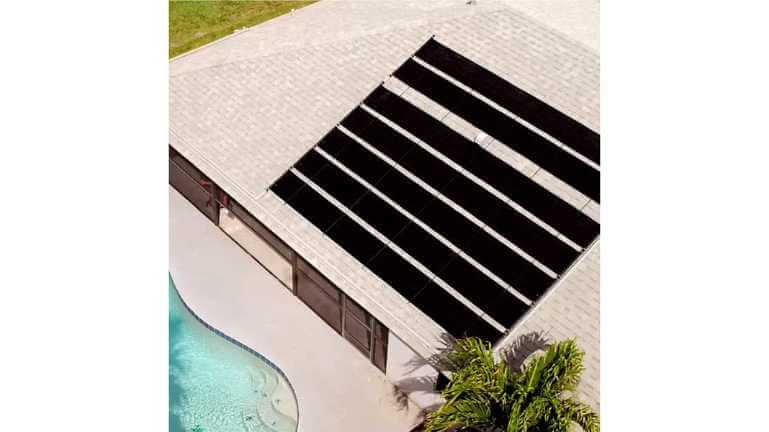Ensuring your pool remains a luxurious oasis year-round demands the right pool heater. From extending swim seasons to maintaining optimal water temperature, choosing the best pool heater is pivotal. Whether you prioritize energy efficiency, rapid heating, or seamless integration with your existing setup, navigating the myriad options can be overwhelming. Let’s explore the top contenders in the realm of pool heating to keep your aquatic haven inviting in any season.
Hayward H250FDN Universal H-Series Pool Heater

Elevate your pool experience with the Hayward H250FDN Universal H-Series Pool Heater. Designed for efficiency and reliability, its Cupro nickel heat exchanger ensures superior value, while the patented polymer header and bypass valve optimize hydraulic performance. Installing this 250,000 BTU heater is a breeze thanks to Hayward’s universal design, offering versatility and professional ease.
With environmentally responsible low NOx emissions, this heater meets or exceeds air quality standards in all regions. Compact at 29 x 28 x 24 inches and weighing 165 pounds, it packs powerful heating capabilities into a sleek, space-saving design. Dive into warm, inviting waters and enjoy extended swim seasons with the Hayward Universal H-Series Pool Heater.
Pros:
- Superior value with standard Cupro nickel heat exchanger
- Patented polymer header and bypass valve for hydraulic efficiency
- Versatile professional installation with Hayward Universal design
- Environmentally responsible, low NOx emissions
Cons:
- Product dimensions of 29 x 28 x 24 inches may require ample installation space
- A weight of 165 pounds may be challenging for some installations
Raypak Natural Gas Pool Heater

Elevate your pool experience with the Raypak Natural Gas Pool Heater. Designed for durability and efficiency, this heater boasts an electronic ignition and digital thermostat for precise temperature control. Its space-age materials ensure minimal residual heat, saving on installation costs. Safety is paramount with intermittent spark ignition pilot controls, activating only when heat is needed. With a wind-resistant design and condensation protection, it’s built to withstand the elements for years to come.
Crafted for residential use, this gas-powered heater exceeds federal efficiency standards while offering high flow rates for optimal performance. Its polymer headers ensure longevity, while its compact dimensions make installation a breeze. Transform your pool or spa into a haven of warmth and relaxation with the Raypak Heater, the pinnacle of reliability and innovation in pool heating technology.
Pros:
- Efficient and reliable heating performance
- Intermittent spark ignition for energy conservation
- Space-age materials prevent heat retention after shutdown
- Durable construction withstands various weather conditions
- Convenient dimensions (44 x 31 x 31 inches) and manageable weight (230 pounds)
Cons:
- May require professional installation
- Natural gas dependency for operation
Smart Pool S601 Pool Solar Heaters

Elevate your pool experience with the Smart Pool S601 Pool Solar Heaters. Crafted with a polypropylene heat collector, this innovative system utilizes a direct flow design, ensuring efficient heating for your in-ground swimming pool. With 80 square feet of solar panels, this accessory is your key to maintaining optimal water temperature, raising it by 6–10°F. Easy to install, the panel array spans 4 feet in width and 20 feet in length, offering seamless integration with your existing setup.
Designed for convenience and performance, the Smart Pool Sun Heater boasts high-density construction, delivering reliable heating without compromising on durability. Whether mounted on your roof or placed strategically, its versatility ensures effective operation. With dimensions of 240 x 54 x 2 inches and a weight of just 34 pounds, this solar heater combines efficiency and portability, making it a must-have addition to your pool maintenance arsenal.
Pros:
- Efficient direct flow system with one header hole per heating tube.
- There are approximately 80 square feet of solar panels for effective heat collection.
- Perfect for in-ground swimming pools, elevating water temperature by 6–10°F.
- sleek 4ft x 20ft panel array integrates seamlessly into pool areas.
- Lightweight at 34 pounds for easy handling during installation.
- Eco-friendly, harnessing solar power for cost-effective pool heating.
Cons:
- Installation kit required, sold separately.
- Dimensions of 240 x 54 x 2 inches may require ample space.
- Dependent on sunlight availability for optimal performance.
Best Pool Heater Buying Guide
Having a pool heater allows you to extend your swimming season and enjoy comfortable water temperatures even when the weather is cooler. With so many types and options for pool heaters available, it can get overwhelming to decide which one is right for your pool. This guide will walk you through the key factors to consider when choosing the best pool heater.
Types of Pool Heaters
Gas Pool Heaters
Gas pool heaters use natural gas or propane to heat your pool water. They tend to heat water faster than electric heaters and are more cost-efficient. Gas heaters have higher upfront costs for purchase and installation compared to electric models. They require ventilation consideration as well.
Electric Pool Heaters
Electric pool heaters use heating elements that are immersed in the pool water or built into the circulation plumbing. They are usually less expensive to purchase than gas heaters but cost more to operate. Electric heaters are also simple to install, as no gas lines or venting is necessary.
Solar Pool Heaters
Solar pool heating systems use solar collectors and pumps to harness heat from the sun and transfer it to the pool water. This is an eco-friendly option that can significantly offset heating costs when conditions are right. Solar heating works best in warmer climates, as performance heavily depends on adequate sunlight.
Heat Pumps
Heat pumps move ambient heat from the surrounding air into the pool water. They tend to have lower operating costs than gas or electric heaters. Installation is more complex and they do not work as well in cooler temperatures or climates.
Key Considerations
Pool Size
It’s crucial to get a pool heater that is properly sized for your pool volume. Undersized heaters will not sufficiently warm the water. Oversized heaters reduce efficiency and become more costly to operate. Consult sizing guidelines based on your pool’s gallons.
Climate Conditions
The climate you live in determines suitable heater types. If you have cold winters, solar and heat pumps have limitations. Gas or electric models may be better for heating in all seasons. Also consider humidity levels, which affect evaporative heat loss.
Budget
Prices can vary greatly depending on the type and size of the pool heater. Consider both upfront system costs and ongoing operation expenses in your area. Develop a budget for purchasing, installing, and running the heater over time.
Maintenance Requirements
While all pool heaters require some maintenance, certain types, like solar and heat pumps, require less compared to gas and electric heaters. Consider time commitments and costs for upkeep, along with equipment lifespan
Conclusion
Choosing the ideal pool heater involves balancing important factors like type, heating capacity, cost, climate suitability, and ease of use. Take the time to thoroughly assess your needs. Determine which features are the highest priority to match those with the best heater option for your pool. With the right selection, you’ll enjoy comfortable water temperatures when pool season arrives.
Frequently Asked Question
What type of pool heater is best for my needs?
There isn’t a one-size-fits-all answer to this question, as the best type of pool heater depends on various factors such as the size of your pool, your budget, energy efficiency preferences, and climate. However, some popular options include gas heaters, heat pumps, and solar heaters. Gas heaters are known for their quick heating capabilities, while heat pumps are more energy-efficient but may take longer to heat the pool. Solar heaters are eco-friendly and cost-effective in the long run, but they depend on sunlight availability.
How do I determine the right size heater for my pool?
To determine the appropriate size heater for your pool, you’ll need to consider the volume of water in your pool, your desired temperature increase, and the outdoor temperature. A general rule of thumb is to calculate the surface area of your pool and multiply it by the desired temperature rise in Fahrenheit. This will give you a rough estimate of the BTUs (British Thermal Units) required to heat your pool efficiently.
Are pool heaters energy-efficient?
The energy efficiency of pool heaters varies depending on the type. Gas heaters tend to have lower initial costs but can be less energy-efficient compared to heat pumps or solar heaters. Heat pumps are generally more energy-efficient as they transfer heat from the air or ground to the pool water. Solar heaters, utilizing renewable energy from the sun, are the most energy-efficient option in the long term, although they may have higher upfront costs.
How much does it cost to install and operate a pool heater?
The cost of installing and operating a pool heater depends on factors such as the type of heater, size of the pool, local energy rates, and climate conditions. Gas heaters typically have lower installation costs but may incur higher operating expenses due to fuel costs. Heat pumps and solar heaters often have higher upfront costs but lower operating expenses over time due to their energy efficiency. It’s essential to consider both upfront and long-term costs when choosing a pool heater.
Can I use a pool heater year-round?
Yes, you can use a pool heater year-round, but its effectiveness may vary depending on the type of heater and your climate. Gas heaters are suitable for maintaining comfortable water temperatures even during colder months, while heat pumps may struggle in extremely low temperatures. Solar heaters can be used year-round in sunny climates but may require additional heating sources during cloudy or winter months. Regular maintenance and proper insulation can help maximize the efficiency of your pool heater throughout the year.

Mark is a seasoned Outdoor Equipment and Heating Appliances specialist. With a passion for adventure and a keen understanding of heating solutions, he brings expertise to the world of outdoor enthusiasts. Mark’s insights, gained through years of experience, make him a go-to resource for those seeking reliable guidance in navigating the realm of outdoor gear and heating technologies.
